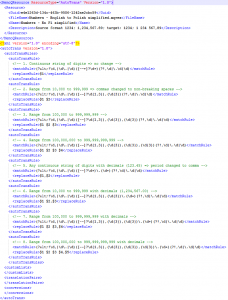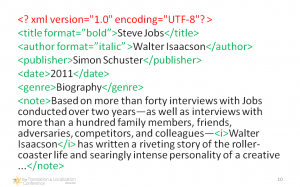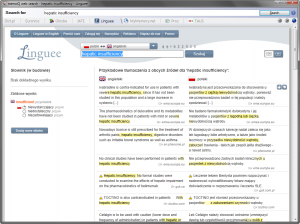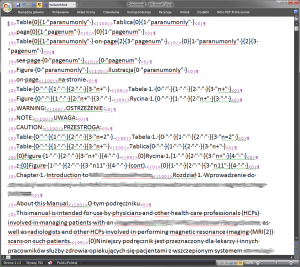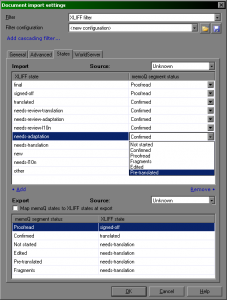Tweet I was invited to write a guest post on regular expressions in FrameMaker at Adobe blog platform. While it is written with FrameMaker in mind, I think the text can help anyone grasp basics of regex for any applications, including translation tools like memoQ or Trados Studio.
Tag: porady
Nov 15
memoQ auto-translatables for numbers
Tweet memoQ is an excellent CAT/TEnT tool which offers plenty of advanced productivity features out of the box, but with little tinkering can be made even more useful. One of the advanced memoQ features is Auto-translatables: using regular expressions you can define how certain source text should be modified in target language. The rules can …
Nov 07
Importing Studio TM and TB into memoQ
Tweet memoQ is great tool with many interoperability features, including easy SDLXLIFF file import/export, ability to import Studio packages and generating Studio return packages. And while packages are imported with translation memories and term bases, strangely the ability to import stand-alone Studio TMs (SDLTM) and TBs (SDLTB) is nowhere to be found in the UI. And this …
Aug 02
Akronimy w kartach charakterystyki (MSDS)
Tweet Dostałem ostatnio zlecenie, które polegało na przetłumaczeniu sporawej listy akronimów stosowanych w kartach charakterystyk i dokumentacji pokrewnej. I choć często tłumaczę dokumenty z tej dziedziny, wykonanie zlecenia zajęło mi nieproporcjonalnie dużo czasu. Ukończona lista została dodatkowo zweryfikowana i poprawiona w ramch uprzejmości przez nieznanego mi kolegę po fachu (dziękuję). Zainspirowany zleceniem skompilowałem nieco większą …
Jun 22
XML translation – part 1: introduction
Tweet The XML has a bad reputation amongst translators – quite often it’s being perceived as something complicated and terribly difficult to translate. However, armed with the basic knowledge of the XML file structure and modern translation environment tools it’s actually usually very easy to correctly translate XML. This is the first installment of a …
May 18
Gdzie znaleźć terminologię
Wywołano mnie do tablicy pytając listownie o dwu- lub wielojęzyczne glosariusze dostępne w Internecie, najlepiej w formacie XLS lub CSV. To bardzo ciekawe pytanie, ponieważ dotyczy jednego z najważniejszych aspektów pracy tłumacza – terminologii. Skąd „brać” terminologię do tłumaczeń, zwłaszcza dotyczących specjalistycznych dziedzin?
Nov 11
Karta charakterystyki substancji (MSDS): glosariusz
Karta charakterystyki substancji, czasem nazywana kartą charakterystki substancji niebezpiecznej, po angielsku Material Safety Data Sheet (MSDS), to, cytując wikipedię: ädokument zawierający opis zagrożeń, które może spowodować określona substancja lub mieszanina chemiczna, a także podstawowe dane fizyko-chemiczne na jej temat. Jej podstawowym celem jest informowanie o potencjalnych zagrożeniach związanych z daną substancją (mieszaniną), metodach ich zapobiegania i procedurach jakie należy wykonać w razie wystąpienia skażenia opisywaną substancją (mieszaniną).”
Sep 27
Dealing with Sajan TMS exports
Tweet One of my end clients recently introduced Sajan TM management system. As a result, instead of Trados TMs and TTX files which were a standard previously, I began to receive jobs as an Excel files, containing source segments and pre-translation (from 80% matches up) in separate columns. Additionally there’s a column with TM match …
May 22
SDLXLIF in memoQ, or There and Back Again
Trados Studio as an internal format uses it’s own flavor of XLIFF, namely SDLXLIFF. Since these files generally adhere to quite loosely defined XLIFF standard, it is easy to open them in other tools supporting XLIFF (particularly in memoQ), translate them and insert translated file back into Studio project. Unfortunately all data on matching and segment statuses are coded in Trados-specific way, so we’ll lose this information when switching tools. Fortunately, there’s a way to keep at least segment states.
May 17
Regular expressions in memoQ
Tweet Regular expressions are special rules which allow us to find a text meeting specified conditions and do something useful with it. In memoQ, this “something useful” may mean segmentation, “auto-translation”, conversion to a tag, or including/excluding text from translation. Regular expressions can be used in memoQ to greatly extend its functionality. During this year’s …

